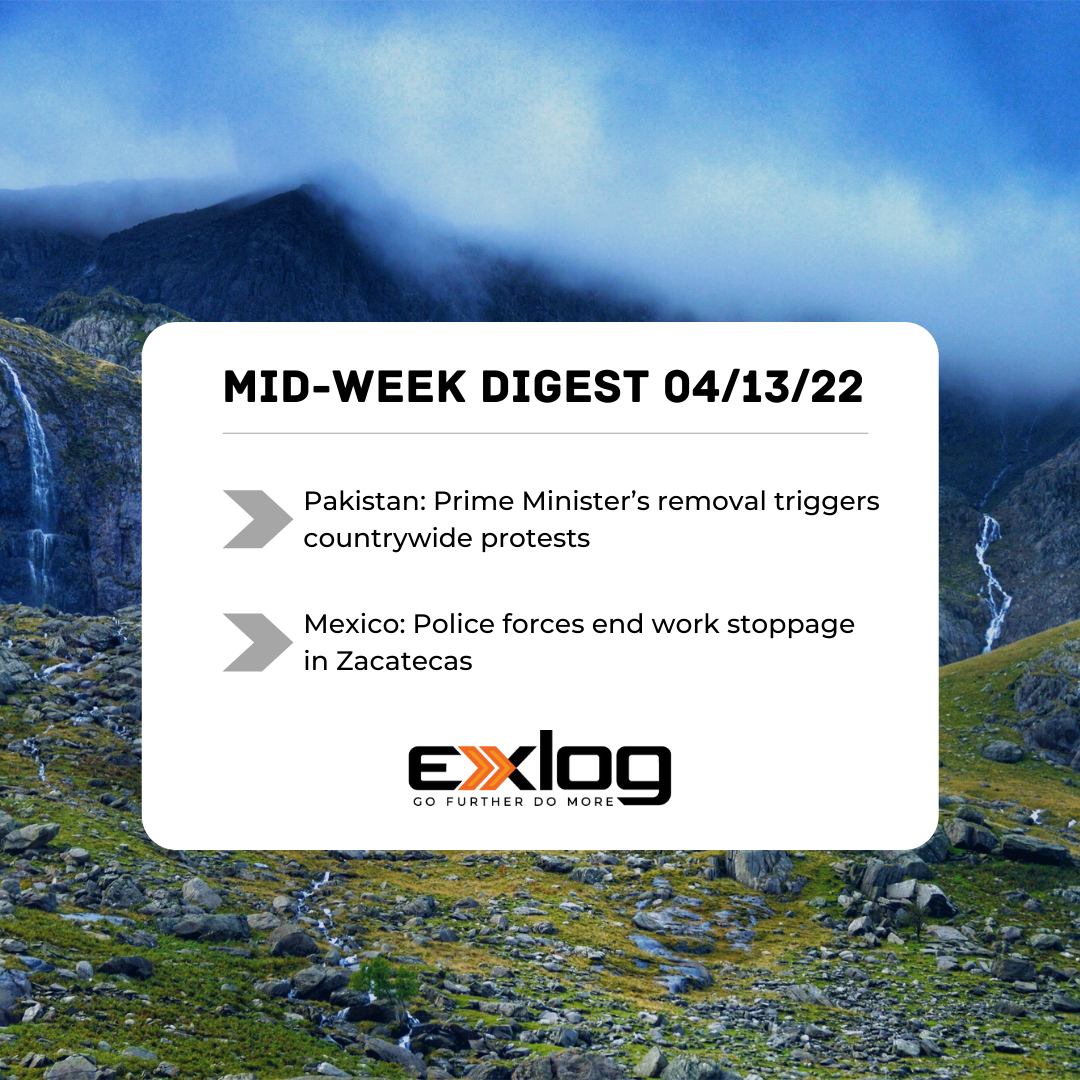Prime Minister removed in Pakistan and Police strike in Zacatecas, Mexico
Pakistan: Prime Minister’s removal triggers countrywide protests
Thousands of Pakistanis joined nationwide protests in support of former Prime Minister Imran Khan, who was removed from office on April 10 following a no-confidence vote by the Pakistani Supreme Court. The demonstrations highlight the destabilizing effects of Khan’s removal, which are likely to persist in the months ahead as the country’s new leadership contends with challenging economic conditions. Khan claimed the decision was influenced by a US-supported “foreign conspiracy” and domestic opposition parties and called for peaceful demonstrations to mobilize supporters of his Pakistan Tehreek-i-Insaf (PTI) party. Mass protests were reported in numerous cities following the vote, including Peshawar, Lahore, Khanewal, Khyber, Jhang, and Quetta. More than 20,000 PTI supporters gathered in Karachi and Islamabad, where security forces blocked roads leading to the parliament building with steel containers. Demonstrators chanted anti-US slogans and obstructed various routes, resulting in significant traffic disruptions. No incidents of violence or clashes between security forces and protesters were reported; however, PTI activists have been accused of vandalizing two religious institutions and torturing four students. While there is currently no indication that pro-Khan groups are planning additional demonstrations, many of the conditions that led to his ouster remain in place and are likely to contribute to heightened political instability in the near term. This includes a deteriorated economic climate marked by severe inflation, which has increased from 3.9% to 13% since 2018 due to the COVID-19 pandemic and Russia’s invasion of Ukraine. Khan’s political rhetoric – especially claims of foreign-sponsored regime change and his refusal to accept the new coalition government headed by Shehbaz Sharif of the Pakistan Muslim League Party (PML-N) – has also increased the threat of ongoing political turmoil, as demonstrated by the mass resignation of more than 100 PTI lawmakers from the National Assembly on April 11. The resignations indicate possible by-elections within two months, which would allow Khan to mobilize his supporters and undermine the new coalition’s agenda. However, should it fail to address the economic grievances that contributed to Khan’s removal, the new government could face similar voter pressures. If political confrontation intensifies, widespread civil unrest and the further weakening of the security environment – aggravated by active militant groups exploiting political instability – are likely ahead of the 2023 general elections.
Mexico: Police forces end work stoppage in Zacatecas
Police forces in the state of Zacatecas have ended their strike and work stoppage upon reaching an agreement with the state government on April 11; however, further work stoppages cannot be ruled out given the worsening security situation in the state and persistent police distrust of the state government. The strike began on March 19 when several police officers demanded the dismissal of three high-ranking security officials over alleged harassment and abuse of power, as well as better working conditions – including salary increase, life insurance, and financial support for the families of slain officers. Following an investigation by the internal affairs, the authorities reinstated the three accused officials and dismissed seven leaders of the organized strike, fueling further discontent and sparking larger demonstrations. Approximately 75% of Zacatecas’ police force participated in the sit-in, taking over the offices of the Public Security Secretariat, the State Government Palace, and the State Congress. While the governor eventually conceded to the protesters’ demands, precedent has demonstrated that previous agreements between the two parties have not been fully honored, which indicates police distrust of the state government is likely to persist and could trigger additional work stoppages. The police strike came amid a deterioration of the security environment in the state driven by competition among various organized crime groups over strategic drug trafficking routes. In particular, conflict between the Sinaloa Cartel and Jalisco New Generation Cartel (CNJG) has contributed to a surge in the homicide rate in Zacatecas, which increased by 466% in the last six years. According to the Executive Secretariat of the National Public Security System (SESNSP), Zacatecas recorded 1,621 targeted killings in 2021, leading to a homicide rate of approximately 99.9 per 100,000 population (compared to the national rate of 26 per 100,000). Police killings have also increased statewide; 16 policemen have been killed year-to-date, compared to 11 police killings reported over the same period in 2021. In the absence of substantial state and federal initiatives aimed at improving safety and work conditions for local police, future strikes, resignations, and an overall security decline in the state are likely in the medium-to-long term.


